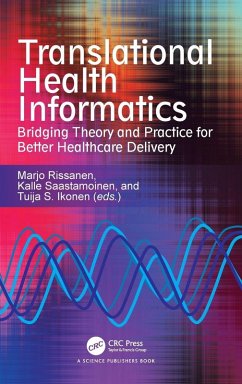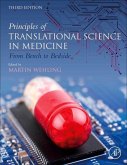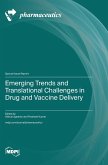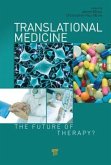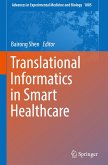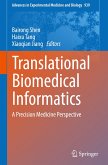Translational Health Informatics
Bridging Theory and Practice for Better Healthcare Delivery
Herausgeber: Rissanen, Marjo; Ikonen, Tuija S.; Saastamoinen, Kalle
Translational Health Informatics
Bridging Theory and Practice for Better Healthcare Delivery
Herausgeber: Rissanen, Marjo; Ikonen, Tuija S.; Saastamoinen, Kalle
- Gebundenes Buch
- Merkliste
- Auf die Merkliste
- Bewerten Bewerten
- Teilen
- Produkt teilen
- Produkterinnerung
- Produkterinnerung
This book discusses the current challenges of translational health informatics. This thought-provoking volume focuses on sector-related "wicked problems", explores questions of change management, and highlights the possibilities of creative and intelligent translational health informatics in optimizing healthcare delivery.
Andere Kunden interessierten sich auch für
![Fundamentals of Evidence-Based Health Care and Translational Science Fundamentals of Evidence-Based Health Care and Translational Science]() Francesco ChiappelliFundamentals of Evidence-Based Health Care and Translational Science106,99 €
Francesco ChiappelliFundamentals of Evidence-Based Health Care and Translational Science106,99 €![Innovative Technologies and Translational Therapies for Deafness Innovative Technologies and Translational Therapies for Deafness]() Innovative Technologies and Translational Therapies for Deafness69,99 €
Innovative Technologies and Translational Therapies for Deafness69,99 €![Principles of Translational Science in Medicine Principles of Translational Science in Medicine]() Principles of Translational Science in Medicine143,99 €
Principles of Translational Science in Medicine143,99 €![Emerging Trends and Translational Challenges in Drug and Vaccine Delivery Emerging Trends and Translational Challenges in Drug and Vaccine Delivery]() Emerging Trends and Translational Challenges in Drug and Vaccine Delivery84,99 €
Emerging Trends and Translational Challenges in Drug and Vaccine Delivery84,99 €![Translational Medicine Translational Medicine]() Translational Medicine149,99 €
Translational Medicine149,99 €![Translational Informatics in Smart Healthcare Translational Informatics in Smart Healthcare]() Translational Informatics in Smart Healthcare121,99 €
Translational Informatics in Smart Healthcare121,99 €![Translational Biomedical Informatics Translational Biomedical Informatics]() Translational Biomedical Informatics113,99 €
Translational Biomedical Informatics113,99 €-
-
-
This book discusses the current challenges of translational health informatics. This thought-provoking volume focuses on sector-related "wicked problems", explores questions of change management, and highlights the possibilities of creative and intelligent translational health informatics in optimizing healthcare delivery.
Produktdetails
- Produktdetails
- Verlag: CRC Press
- Seitenzahl: 302
- Erscheinungstermin: 22. Oktober 2025
- Englisch
- Abmessung: 240mm x 161mm x 21mm
- Gewicht: 619g
- ISBN-13: 9781032831749
- ISBN-10: 103283174X
- Artikelnr.: 75124633
- Herstellerkennzeichnung
- Libri GmbH
- Europaallee 1
- 36244 Bad Hersfeld
- gpsr@libri.de
- Verlag: CRC Press
- Seitenzahl: 302
- Erscheinungstermin: 22. Oktober 2025
- Englisch
- Abmessung: 240mm x 161mm x 21mm
- Gewicht: 619g
- ISBN-13: 9781032831749
- ISBN-10: 103283174X
- Artikelnr.: 75124633
- Herstellerkennzeichnung
- Libri GmbH
- Europaallee 1
- 36244 Bad Hersfeld
- gpsr@libri.de
Marjo Rissanen is a senior consultant specializing in health informatics. She holds a Doctor of Science degree in neuroscience and biomedical engineering from Aalto University, Finland, and M.Sc. in healthcare administration from the University of Helsinki's Faculty of Medicine. She has conducted modeling work within translational health informatics, patient-specific cost analysis and related intensity issues. Her experience includes working as a designer in the health informatics industry, contributing to international development projects, and engaging in research and design activities involving big data analytics at the Ministry of Social Affairs and Health and the University of Helsinki. Kalle Saastamoinen is a researcher in defense technology with a PhD in applied mathematics and over 25 years of experience in academia and military research. He has led numerous projects at the Finnish National Defence University, focusing on simulation, artificial intelligence, and operational analysis. In March 2025, he joined the Simulator Centre of Excellence at the Finnish Army Academy, where he continues to explore cutting-edge applications of AI and modeling in military training and planning. His recent work investigates the use of generative AI, machine learning, and advanced forecasting methods, open-source intelligence, and autonomous systems. He is an active contributor to NATO research groups and has published extensively in peer-reviewed venues. Tuija S. Ikonen serves as Professor of Patient Safety at the University of Turku and Director of the Finnish Centre for Client and Patient Safety. She is also a thoracic and vascular surgeon and a specialist in public health. Additionally, she acts as a Medical Advisor to the Finnish Patient Insurance Centre. She is a member of the supervisory body for client and patient safety strategy implementation at the Ministry of Social Affairs and Health, and a former member of the advisory board for quality registers at the Finnish Institute for Health and Welfare. She has published over 120 original and review articles on preclinical, clinical, and registry research, health technology assessment, quality improvement, healthcare administration and leadership.
Preface. PART 1: BRIDGING THEORY AND PRACTICES IN TRANSLATIONAL HEALTH
INFORMATICS. 1. Translational Health Informatics: Bridging Theory and
Practice with Strategic Emphases. 2. Translational Design Challenge and
Patient Safety in Diagnostics and Medication. 3. Translational Health
Informatics and Dilemmas in Inclusive Design. 4. Advancing Algorithmic
Thinking for the Application of Artificial Intelligence in Healthcare. PART
2: ASSESSING DIGITAL AND AI HEALTH TECHNOLOGIES. 5. Risk Assessment and
Safety of Digitalized Healthcare. 6. Transformative Health Technology
Assessment of Dynamically Developing Digital and AI Innovations. PART 3:
IMPLEMENTATION AND MANAGEMENT IN HEALTHCARE DIGITAL AGE. 7. Artificial
Intelligence and the Patient: The Role of Privacy in Hospital
Administration Settings. 8. Electronic Health Records Ethics. 9. Managing
the Implementation of Artificial Intelligence - Enterprise Architecture &
Business Value Considerations and Relevant Risks. 10. Group Dynamics and
Human Resource Management in the Digital Healthcare. 11. Comprehending
Change Management in Strategic Design.
INFORMATICS. 1. Translational Health Informatics: Bridging Theory and
Practice with Strategic Emphases. 2. Translational Design Challenge and
Patient Safety in Diagnostics and Medication. 3. Translational Health
Informatics and Dilemmas in Inclusive Design. 4. Advancing Algorithmic
Thinking for the Application of Artificial Intelligence in Healthcare. PART
2: ASSESSING DIGITAL AND AI HEALTH TECHNOLOGIES. 5. Risk Assessment and
Safety of Digitalized Healthcare. 6. Transformative Health Technology
Assessment of Dynamically Developing Digital and AI Innovations. PART 3:
IMPLEMENTATION AND MANAGEMENT IN HEALTHCARE DIGITAL AGE. 7. Artificial
Intelligence and the Patient: The Role of Privacy in Hospital
Administration Settings. 8. Electronic Health Records Ethics. 9. Managing
the Implementation of Artificial Intelligence - Enterprise Architecture &
Business Value Considerations and Relevant Risks. 10. Group Dynamics and
Human Resource Management in the Digital Healthcare. 11. Comprehending
Change Management in Strategic Design.
Preface. PART 1: BRIDGING THEORY AND PRACTICES IN TRANSLATIONAL HEALTH
INFORMATICS. 1. Translational Health Informatics: Bridging Theory and
Practice with Strategic Emphases. 2. Translational Design Challenge and
Patient Safety in Diagnostics and Medication. 3. Translational Health
Informatics and Dilemmas in Inclusive Design. 4. Advancing Algorithmic
Thinking for the Application of Artificial Intelligence in Healthcare. PART
2: ASSESSING DIGITAL AND AI HEALTH TECHNOLOGIES. 5. Risk Assessment and
Safety of Digitalized Healthcare. 6. Transformative Health Technology
Assessment of Dynamically Developing Digital and AI Innovations. PART 3:
IMPLEMENTATION AND MANAGEMENT IN HEALTHCARE DIGITAL AGE. 7. Artificial
Intelligence and the Patient: The Role of Privacy in Hospital
Administration Settings. 8. Electronic Health Records Ethics. 9. Managing
the Implementation of Artificial Intelligence - Enterprise Architecture &
Business Value Considerations and Relevant Risks. 10. Group Dynamics and
Human Resource Management in the Digital Healthcare. 11. Comprehending
Change Management in Strategic Design.
INFORMATICS. 1. Translational Health Informatics: Bridging Theory and
Practice with Strategic Emphases. 2. Translational Design Challenge and
Patient Safety in Diagnostics and Medication. 3. Translational Health
Informatics and Dilemmas in Inclusive Design. 4. Advancing Algorithmic
Thinking for the Application of Artificial Intelligence in Healthcare. PART
2: ASSESSING DIGITAL AND AI HEALTH TECHNOLOGIES. 5. Risk Assessment and
Safety of Digitalized Healthcare. 6. Transformative Health Technology
Assessment of Dynamically Developing Digital and AI Innovations. PART 3:
IMPLEMENTATION AND MANAGEMENT IN HEALTHCARE DIGITAL AGE. 7. Artificial
Intelligence and the Patient: The Role of Privacy in Hospital
Administration Settings. 8. Electronic Health Records Ethics. 9. Managing
the Implementation of Artificial Intelligence - Enterprise Architecture &
Business Value Considerations and Relevant Risks. 10. Group Dynamics and
Human Resource Management in the Digital Healthcare. 11. Comprehending
Change Management in Strategic Design.

